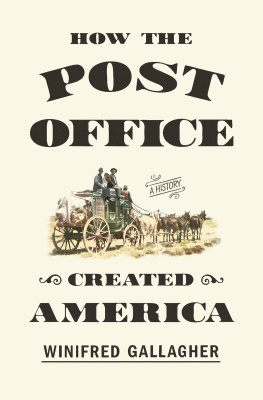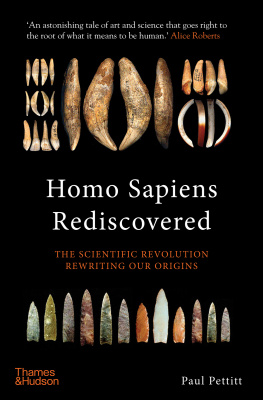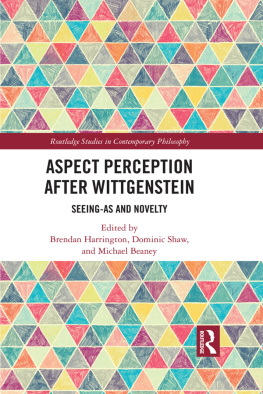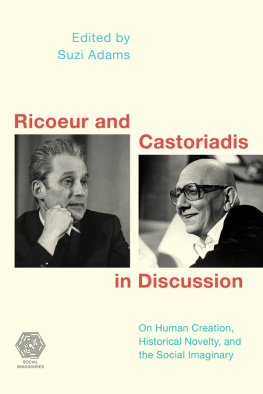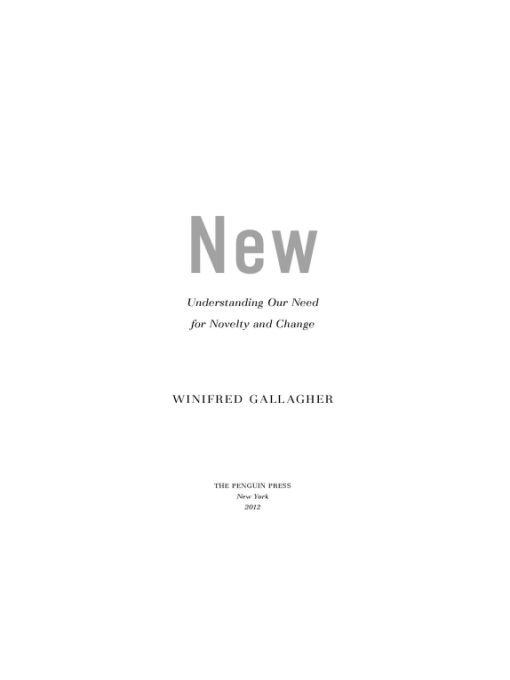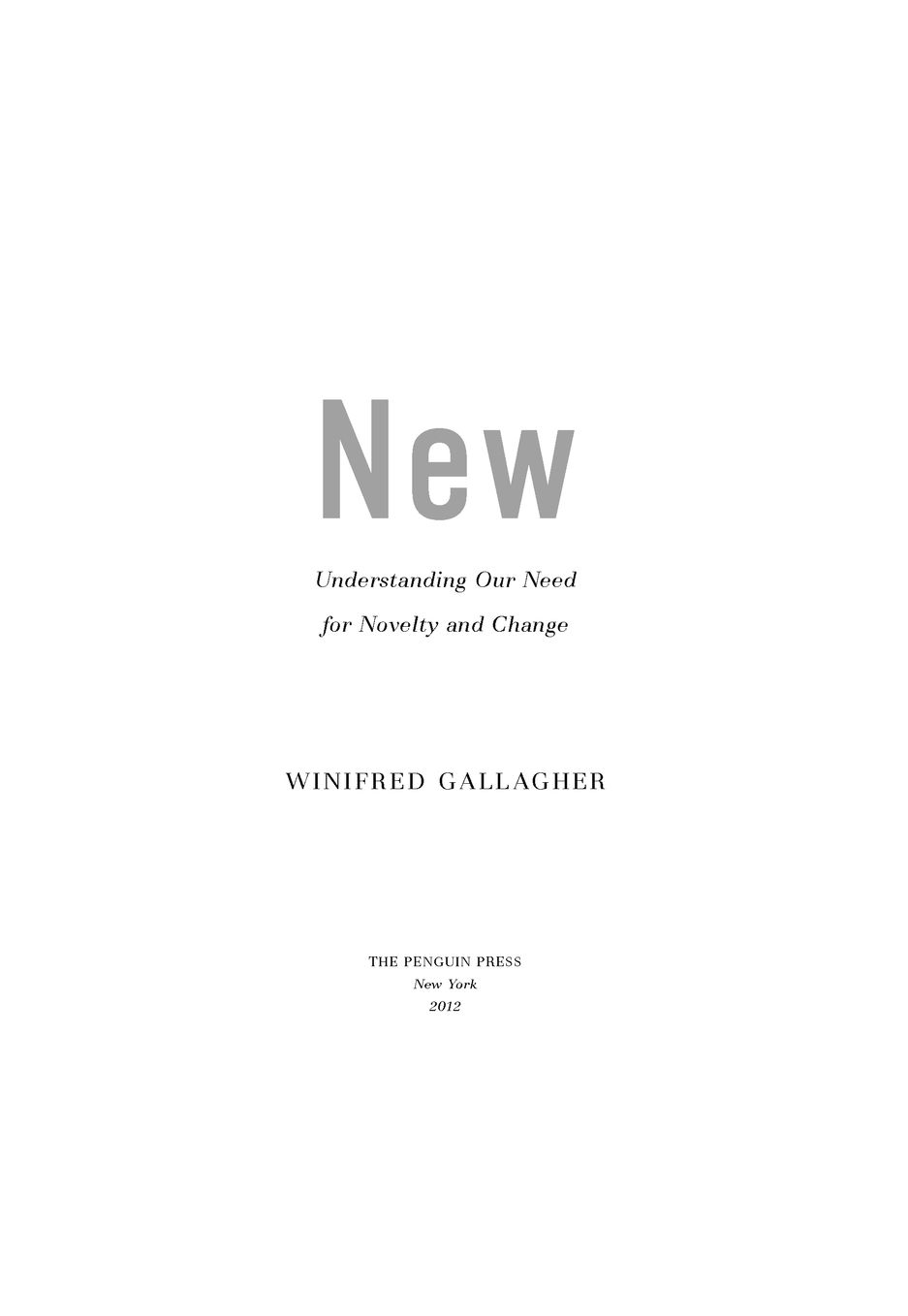Table of Contents
ALSO BY WINIFRED GALLAGHER
Rapt: Attention and the Focused Life
House Thinking: A Room-by-Room Look at How We Live
Just the Way You Are:
How Heredity and Experience Create the Individual
The Power of Place: How Our Surroundings Shape Our Thoughts,
Emotions, and Actions
Spiritual Genius:
10 Masters and the Quest for Meaning
Working on God
The universe is change; our life is what our thoughts make it.
Marcus Aurelius, Meditations
Introduction
Whats New?
SCIENTISTS, ARTISTS, AND SCHOLARS have cast us as analytical thinkers and passionate romantics, pragmatic toolmakers and spiritual souls, aggressive competitors and cooperative altruists. None of these views is complete, yet each has illuminated human beings in a helpful way. Now our fast-paced world invites us to see ourselves in yet another lightthis time as natures virtuosos of change, who are biologically as well as psychologically primed to engage with novelty.
Our genius for responding to the new and different distinguishes us from all other creatures, saved us from extinction 80,000 years ago, and has fueled our progress from the long epoch of the hunter-gatherers through the agricultural and industrial eras into the information age. Suddenly, however, were confronting many, many more new objects and subjects, from products to ideas to chunks of data, than have ever existed before, and theyre coming at us faster and faster. We sometimes feel taxed if not overwhelmed, but New argues that our rewards will far outweigh our frustrations if we stay true to the evolutionary purpose of our neophilia, or affinity for novelty: to help us adapt to, learn about, or create the new things that matter, while dismissing the rest as distractions.
Novelty comes in countless forms, but to see how were dealing with one especially timely manifestation, lets tap our brains ability to travel through space and timeitself a triumph of neophiliato visit a large airport just after mechanical trouble has delayed the 9:00 A.M. flight to Denver. The waiting area is immediately transformed into a satellite laboratory thats part of a vast, ongoing experiment with a new way of life based on information technology. Whatever their size or function, these machines can be defined in two words: novelty generators.
Charlotte, a high-school teacher, and her nine-year-old son, Jack, adjust quickly to the irksome change in plans. She takes out her laptop, scans the headlines on a news Web site, then settles down to fine-tune the presentation shes going to give at a professional conference. To limit distractions while she works, she sends her calls to voice mail and checks her e-mail just once an hour or so. The better to enjoy his holiday, Jack decides to get some homework out of the way and pulls out his new tablet computer, which is already almost a body part. First he goes over Spanish vocabulary for an upcoming test, then he does some research on the Oregon Trail. After working for a while, he takes a break to e-mail a few friends and cajoles his mom into playing a little chess, which hes learned from a special app.
When they finally board the plane three hours later, Charlotte is pleased that she managed to turn a setback into a productive morning and rewards herself by reading her e-book mystery. Jack shows a fascinated older passenger a computer game that he usually enjoys with the familys cat: with paw or finger, the players try to catch a fiendishly evasive glowing red mouse. This mother and child are classic neophiles, who have a positive but well-balanced attitude toward novelty. They focus selectively on those new thingshere, pieces of electronic informationthat help them to learn or accomplish something worthwhile, including reasonable amounts of R&R, and smoothly adjust to and exploit change, such as the sudden hitch in their plans.
A young partner in an Internet start-up, Ted is first riled up by the unexpected change, alternating between punching excuses for missing a big meeting into his BlackBerry and phoning headquarters to bark orders at subordinates. Within moments, however, hes escorting a striking fellow passenger to an impromptu breakfast, complete with Bloody Marys. When more exciting options seem exhausted, he pops open his razor-thin laptop and, despite frequent checks for messages and the odd Call of Duty gaming break, comes up with an edgy marketing idea.
Ted excels at inventive thinking, corporate competition, and personal charm, but by the time his outraged seatmate chides him for texting as the plane taxis down the runway, his morning has produced mixed results. He experienced some frisson and did some good work, but he also generated agita for others and wasted time on distractions. This neophiliac, or extreme novelty-seeker, responds to change and the new as sources of the stimulation he craves, which helps explain both his talent for brainstorming and his powerful attraction to pretty strangers, cocktails, and alluring information machines.
Alan, an older accountant who expects things to go as planned, shifts between quietly fuming at the delayed flight and worrying about the mechanical snafu that caused it. To calm down, he retreats into his morning routine of reading the print versions of the Wall Street Journal and the New York Times and then reviews a big clients tax records for the second time. Hes resigned to taking his cell phone on business trips but has no interest in other gadgets. His colleagues get annoyed when he resists learning a new software program or procedure, but like their customers, they also value his attention to detail and wariness of risk. When he takes his seat on the plane, this neophobe, who responds to the new and unexpected with caution or anxiety, has done his best to make this morning much like any other, which is his ideal.
Like most behavior, neophilia occurs on a spectrum. Ted and Alan are situated toward its high and low ends, while Charlotte and Jack represent the moderate majority, who are arrayed along the capacious middle range. Their different responses to novelty and change suggest the three basic ways in which individuals interpret lifes great imperative: to survive and thrive by balancing the sometimes conflicting needs to avoid risk and approach rewards.
Vital information about potential threats and resources is likelier to come from things that are new or unfamiliar than from the same old same old. Because they can affect survival, nature ensures that all living creatures react to novelty and change. A swerving car on the highway, a jump in your bad cholesterol, or a drop in a stocks value rivets your attention and jangles your nerves, which prime you to protect yourself from harm. On the other hand, an exciting IPO, intriguing job offer, or innovative home design can also attract your focus, lure you into learning new things, and perhaps increase your well-being.
Dodging risks and seeking rewards both make good evolutionary sense, but variations in nature and nurture incline individuals to prioritize them differently. The approximately 10 percent to 15 percent of us who are neophobes like Alan are biased toward staying safe, and the roughly similar number of neophiliacs like Ted, toward seeking bonuses. The remaining 70 percent to 80 percent are moderate neophiles of different degrees who, like Charlotte and Jack, want to be neither scared stiff by too much novelty and change nor bored stiff by too little. They tend to seek the new and different more in their intellectual, creative, and recreational pursuits than in domains that require continuity and familiarity, such as their close relationships or professional commitments. In other words, they follow Alexander Popes advice: Be not the first by whom the new are tried, nor yet the last to lay the old aside.


